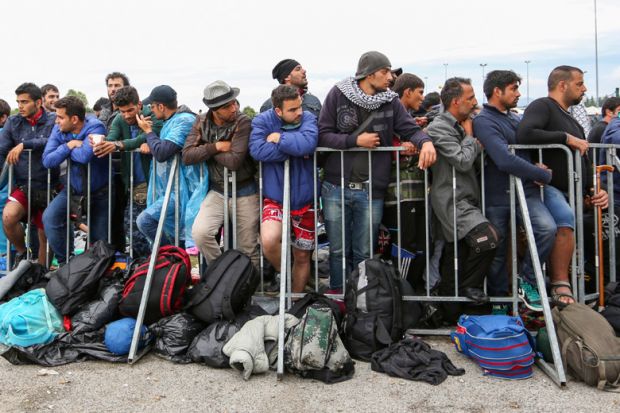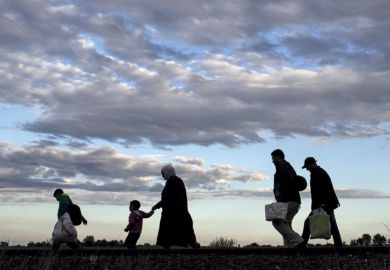Syria is in Europe, certainly according to the ancient Greeks. Europa was a princess from Phoenicia, an ancient civilisation in today’s Syria (and Lebanon), who was taken by Zeus, the Greek “King of the Gods”, to the island of Crete, where she gave birth to Minos.
But Syria is not only in Europe because of this tale of cross-cultural love. Today, Syria is a European issue because of the impact of numbers and the human tragedies beyond them. According to the United Nations High Commissioner for Refugees, 897,645 Syrians claimed asylum in European countries between April 2011 and December 2015. Thousands die on their way, such as Aylan Kurdi and his five-year-old brother, who fled the battle between Islamic State militants and Kurdish forces in the Syrian city of Kobani. Ironically, Greece continues to be the entry point for most Syrians. Migrants from Syria try to take advantage of the proximity to Greek islands such as Chios, Kos and Lesbos, which are close to Turkey. As of June 2015, 124,000 migrants had arrived in Greece, most of them Syrians fleeing the chaos in their country.
Most Syrians try to make it into Germany, in particular after German chancellor Angela Merkel made it clear that she considers it a “moral duty” to alleviate the refugee crisis in the European Union. Many of them are highly educated, a factor that did not escape the attention of the German government. German universities have already relaxed some of the bureaucratic hurdles for enrolment of prospective students with a refugee background. As Newsweek reported recently, in Germany, about “60 universities are offering free courses and some are even waiving their expensive fees to Syrian nationals who arrived in Germany this year, including three institutions in the capital Berlin and 16 in the northeast of the country”.
All the same, Europe is hosting but a small fraction of Syrian refugees compared with regional countries. Turkey, for example, has been catering for 2.5 million Syrians, and Turkish universities were quick to admit Syrian students. In the academic year 2011-12, there were 608 Syrian students in Turkey. That number increased to 4,597 in the last academic year. Moreover, Lebanon, a country half the size of Wales, has been hosting 1.1 million Syrians, constituting almost 25 per cent of its overall population.
Syria seemed remote when the brutal civil war started in 2011. At that stage, there was a lot of short-sighted hyperbole about the impending demise of Bashar al-Assad. Hence, the EU and the US underestimated the repercussions of the conflict. Donor conferences and peace initiatives were pursued in earnest only after years in which the war translated into a “refugee crisis”. National and Europe-wide institutions were slow to react. With the financial pressures on British universities, for instance, targeted support for students with a refugee background has proven to be difficult to pursue systematically. Until today, there is no sector-wide initiative.
The challenge is not a small one, of course. We are witnessing the largest movement of people since the Second World War. This is a new dimension of an intensely intimate “Eurasian” dynamic that binds Europe and West Asia and North Africa together in a fundamentally new way. This interdependence is not only due to the movement of people: the political linkages are apparent, too. The “refugee crisis” in Europe has been turned into a major theme by Eurosceptics for whom controlling Europe’s borders has turned into a fortuitous vote winner. In that way, the crisis in Syria has aggravated the crisis of the EU, even though Europe is by far less affected by the influx of refugees than the other countries within the region.
Syria is in Europe begets that Europe is in Syria. The Eurasian dynamics are real for everyone to see. Scholars of international relations and Middle Eastern studies have argued for years that in today’s interconnected world, security is mutual, cultures are intertwined and lives are interdependent. Such scholarship may provide a better early warning system for the tremors of a globalised world. For the love of Europa, that Syrian-Lebanese princess who started the genealogy of this continent, Europe needs more cosmopolitan understanding and outreach, and not less.
Arshin Adib-Moghaddam is professor in global thought and comparative philosophies at Soas, University of London.
Register to continue
Why register?
- Registration is free and only takes a moment
- Once registered, you can read 3 articles a month
- Sign up for our newsletter
Subscribe
Or subscribe for unlimited access to:
- Unlimited access to news, views, insights & reviews
- Digital editions
- Digital access to THE’s university and college rankings analysis
Already registered or a current subscriber?







